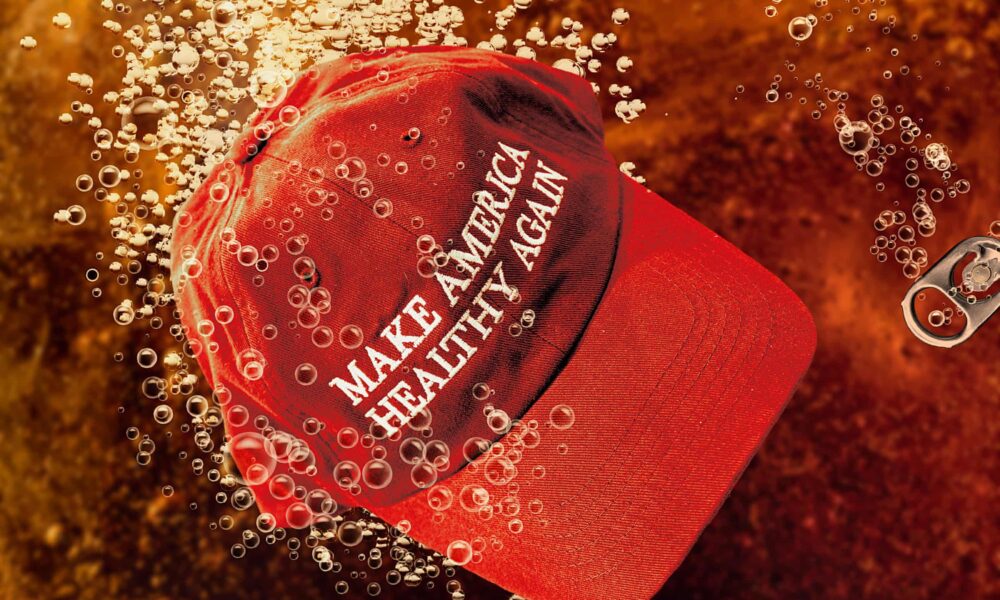A coalition of major U.S. soft drink and snack food corporations is orchestrating a campaign aimed at countering the influence of Robert F. Kennedy Jr.’s “Make America Healthy Again” (Maha) initiative. This effort, detailed in an investigation by The Guardian in partnership with the environmental watchdog Fieldnotes, seeks to undermine movements aimed at reducing soda and ultra-processed food consumption among Americans.
The companies involved have tapped into a network of pollsters, strategists, and political financiers with strong connections to the national Republican Party. Many of these individuals have taken steps to obscure their ties to one another and to the broader campaign. This strategy has been bolstered by a coalition of free-market advocates who previously supported Donald Trump’s deregulatory efforts.
The campaign features a range of actors, including Maga influencers engaged by a firm that promotes “anti-woke” films. Additionally, it includes a research group that had connections to Lee Zeldin, who was nominated by Trump to lead the U.S. Environmental Protection Agency. Prominent media outlets funded by right-wing billionaires, such as Leonard Leo and Charles Koch, also play a role in this initiative.
The American Beverage Association (ABA), alongside the Consumer Brands Association, is at the forefront of this lobbying effort. Major beverage companies, including Coca-Cola, PepsiCo, and Keurig Dr Pepper, are among the members funding these trade groups, which are working to protect their interests against the growing Maha movement. Recent annual reports from these companies highlighted potential threats to their profits stemming from the Maha-led initiatives, particularly in schools and nutrition assistance programs.
Coca-Cola and Keurig Dr Pepper explicitly identified the Maha initiatives as significant risks in their investor communications following Trump’s nomination of Kennedy as Secretary of Health and Human Services. The companies have expressed concerns that risks could escalate if unnamed “government officials” begin to voice health concerns regarding their products.
The specific policies drawing scrutiny include proposals to prohibit schools from serving foods containing petroleum-based dyes and to restrict the use of SNAP benefits for purchasing soft drinks. Lobbyists have communicated a clear message to conservative lawmakers: oppose the Maha initiatives or risk a backlash from Maga supporters.
In an unsigned memo earlier this year, the beverage lobby stated, “Working-class families and individuals across America rose up to vote for President Trump on the promise of a new era that would lift them up, not leave them behind again.” The memo warned that supporting restrictions on SNAP could “betray those voters and that promise.”
While resistance in Washington has largely stalled, the Maha nutrition efforts have gained traction at the state level. A dozen states have successfully sought waivers from the U.S. Department of Agriculture to limit the use of SNAP benefits, while several others have enacted legislation restricting food dyes in school meals.
In Utah, Republican state representative Kristen Chevrier, who sponsored bills addressing both SNAP and school meals, stated that the industry’s influence is more pronounced federally than at the state level. “It’s easier for the big food industries to control the federal government than it is for them to control a whole bunch of different states,” she observed.
Chevrier, who identifies as “a Maha mom before Maha was a thing,” noted that industry lobbyists focused significantly on their profits rather than the health implications for vulnerable populations. “The lobbyists were more concerned about the money they were going to lose if people stopped buying soda with SNAP dollars,” she said.
Records obtained through public information requests reveal that lobbyists have actively employed the Maga-versus-Maha messaging to thwart state-level nutrition bills. Veteran Republican strategists have acted as intermediaries, creating a perceived distance between the corporations and their narratives.
In late February, while Maha legislation was progressing in the Arizona legislature, soda lobbyist Michael Gardner contacted lawmakers to advocate against the SNAP legislation, which was later vetoed by the governor. He referenced an article titled “Trump voters want SNAP users to be able to buy soda,” which was based on a poll funded by the ABA itself.
The polling was conducted by Public Opinion Strategies, a firm owned by Glen Bolger, who has ties to the National Republican Congressional Committee. The ABA paid Bolger’s firm nearly $2 million in 2023 for its services.
Gardner’s outreach was part of a broader strategy that included another lobbyist, Erin Raden from the Consumer Brands Association, who was also working against Arizona’s school meal legislation. Raden pointed to a right-wing article suggesting that Trump voters preferred such decisions to be left to the president.
The underlying polls used to support these arguments often lack transparency. The Plymouth Union Public Research group, which conducted a poll referenced by Raden, is a 501(c)(6) non-profit that is not currently listed in the IRS database, raising questions about its legitimacy.
While the Trump administration sometimes pushes back against the notion that the Maha agenda conflicts with its base, the beverage industry remains vigilant. Following Arkansas Governor Sarah Huckabee Sanders’ application for a SNAP waiver, the ABA labeled state officials as “food police” on social media.
As industry lobbyists engage directly with lawmakers, an industry-funded front group, Americans for Food and Beverage Choice, has launched a small-scale Facebook ad campaign promoting the industry’s polling in nine states. Although the group claims to be grassroots, tax filings reveal that its leadership is composed of individuals from the ABA.
Meanwhile, Maga-aligned influencers have disseminated the pro-soda narrative across social media platforms without disclosing their paid status. One influencer, Eric Daugherty, tweeted against the Maha messaging, asserting that it could restrict the purchasing choices of needy Americans.
Despite the backlash, the paid-influencer campaign, orchestrated by the firm Influenceable LLC, has gained momentum. This company has previously garnered attention for promoting controversial political messages and has received funding from conservative organizations.
In a rapidly evolving landscape, the beverage industry’s response to the growing Maha movement underscores the intersection of health, politics, and corporate interests. With both sides mobilizing resources, the outcome remains uncertain, but the stakes for public health and corporate profitability are undeniably high.







